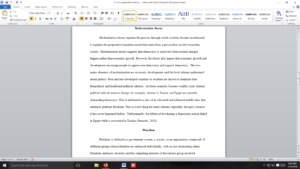Comparative Politics
This Assignment has two sections:
- 5 short-answer identification questions
- 1 essay question worth (choose 1 out of 2).
This assignment was originally designed to be completed in-class in 75 minutes.
Part 1:
Choose any five of the following terms and give me a definition of the term and an example. The example must be a real example from comparative politics.
Here is a list of the terms. Remember, choose any 5 of these (if you answer more than 5 I will just grade the first 5):
- Civil society
- Descriptive representation
- Gender
- Modernization theory
- Outgroup
- Pluralism
- Populist party
- Resource curse
Part 2:
Write a short essay (no more than 2 double-spaced pages) on the following prompt:
Choose one of the following questions. Your answer should be in the form of an essay. A good answer will probably be about 3 to 5 paragraphs. In your answer, compare two examples of collective action. Don’t use the same example you are using in your paper.
- 1- Consider rebel groups in civil wars. Why do people sometimes join rebel groups, and when will rebel groups succeed? Use two different rebel groups as examples.
- 2- Consider pro-democracy movements. Why do people sometimes join these movements, and when will movements succeed? Use two different movements as examples.
Requirements: 3 to 4 pages
Answer preview
benefits or opportunities and social positions that they feel have been denied by the ruling regimes. Another reason people join rebel groups includes economic decline, which affects a country’s citizens’ income level. Reduced income means that the citizens cannot afford basic commodities and services, leading to unrest in demand for the government to address their issues. Commodity price volatility can also trigger rebel groups’ formation because it affects the available household income for citizens in a country (Walter, 2019). This leads to domestic instability and mainly happens in low-income countries. Instability in homes eventually leads to rebel groups’ formation to demand assistance from the government or the leadership.
[959 Words]

Comparative Politics

